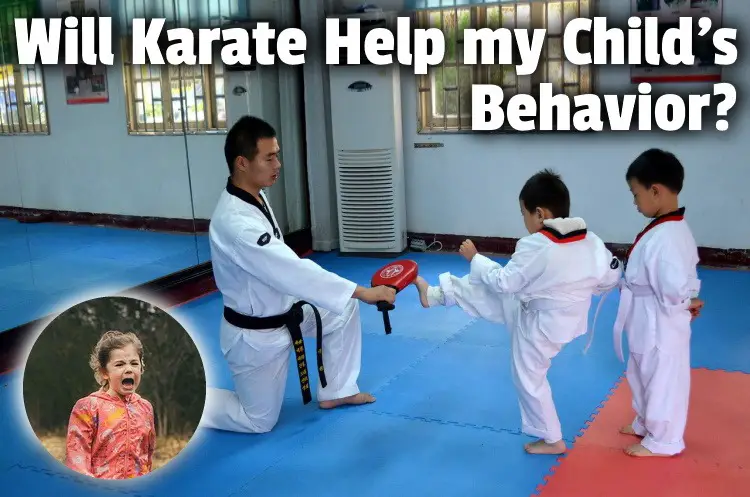
Karate is highly popular with children. But many kids struggle with behavioral challenges, and many parents sign their kids up for martial arts for the emotional benefits. So will Karate help my child’s behavior?
Karate does help with children’s behavior. While Karate will teach children to defend themselves, additionally, it teaches children the crucial skills of self-regulation, discipline, confidence, and the resilience to work through challenges without giving up or getting angry.
But there’s a lot more to learn.
In this article, we’ll explore whether Karate helps with anger and if it makes you aggressive. But we’ll also learn whether it helps children regulate their emotions.
Let the fun begin.
Does Karate help with anger?
Yes, Karate helps with anger management. Karate, like other martial arts, involves mindfulness and breathing techniques. These, along with an intense physical workout and discipline help an individual to be calmer and to better regulate their emotions.
(source)
Over time, they attain greater control because they realize that they can channel their emotions into positive, anger-free forms.
Mindfulness is a highly popular practice that’s proven to help reduce anger and improve one’s capacity to control oneself. And that concept largely comes from Asia, where martial arts originated.
That said, it’s vital to stress that anger is a natural human emotion.
It’s normal to be angry when people have wronged us. It may also point the way toward how to resolve the problem that triggered it. But if it’s not controlled, anger can unleash the “beast in us”, such that we become destructive!
Karatekas only defend themselves as a last resort.
They’re not trained to look for fights or to bully others because it’s actually a system for refining one’s character. As one practices the Katas and spars with others, one gradually learns how to control one’s anger.
There are rules and values that those learning Karate abide by.
Respect for others is one of the key rules, and in the dojo, there are penalties for flouting them. So, in addition to mindfulness, the rules and values provide a framework that curtails anger.
Because of the intense physical activity that’s involved, Karate helps in reducing stress.
Stress, as we know, is one of the triggers of anger. So, after you’ve been practicing Karate for some time, you’d most probably notice that you’re not as stressed as you used to be and that you’re actually feeling happier. (It’s because endorphins are being released in your bloodstream).
But how young is too young to start in martial arts?
To learn about the best age for a child to start martial arts, check out a recent article of mine. I got into how young schools typically take kids, but I also addressed the perfect starting age for them to really stick with it.
Just click the link to read it on my site.
Modern life can cause anger and frustration. Finding a positive outlet for aggression and anger, in a group of friendly and supportive people – that’s Karate. #karate #health #anger pic.twitter.com/sx9sojeecc
— Manchester Karate (@KarateMcr) February 20, 2020
Does Karate make you aggressive?
Karate does not make practitioners aggressive. In fact, with better situational awareness, improved confidence, and self-regulation, it becomes easier to avoid aggressive tendencies or confrontations. Karate is about de-escalation and the control of aggressive tendencies both in themselves and others.
It’s exceptionally rare to meet Karatekas that are aggressive.
So, in truth, becoming a Karateka won’t make you more aggressive. In fact, the opposite is the case. As you dive deeper into it, you realize that it’s not simply a way to defend yourself.
And it’s not about picking up fights and beating up 3 dudes at a time.
It’s a “budo”, a way of life, that is about refining one’s character. If you’re aggressive, you’ll learn ways to focus and channel your aggression, and in time you’ll gain control over it.
Karate will equip you with the skills to transmute your aggression into something positive.
After passing her test last month she didn’t get her belt due to some behavior issues. We emphasized character in all places, not just at karate. Tears & anger came as a result of Amanda and I withholding her belt. Discipline produces character. I’m so proud of my daughter! pic.twitter.com/CL8qSZNPgi
— Will Basham (@will_basham) April 20, 2021
Will Karate help my child learn to regulate their emotions?
Karate does help children learn to regulate their emotions. Children will learn discipline and resilience, which are key in learning to control one’s feelings. But breathing techniques and improved confidence from mastering skills also factor in.
(source)
Karate is a way of building one’s character through the mastery of the techniques that have been perfected over centuries.
So, children are introduced to its moral code. They learn that it’s a tool for becoming a better human being and for self-defense. And that it should only be used as a last resort.
Contrary to what most people think, it does not promote aggression; instead, aggressive tendencies in children find a healthy outlet in their practice of Kata and in sparring with others.
So, they learn to control their emotions by channeling them into positive, harmless channels.
The reality is that most children find a lot of joy in practicing Karate, and they would gradually become able to exercise greater self-control naturally. They are not being lectured to; they themselves are experiencing the benefit.
The positive emotions they experience as they practice are powerful positive reinforcement. And all around them, in the dojo, they would see practical examples of how many other children are also learning how to manage their emotions.
Seeing as we are social animals, this “peer pressure” helps them mature.
Ninjas Karate – https://t.co/GnHseEuEuK
The Ninjas Karate Program is an introductory karate class specifically designed for children ages 4 and 5. It focuses on teaching children eight important main life skills: focus, memory, teamwork, discipline, self-control & fitness. pic.twitter.com/iayLL1fxbP— Saline Community Ed (@SalineCommEd) September 16, 2021
Is Karate good for a hyperactive child?
Karate is good for hyperactivity in children. Karate, in addition to its character-building dimension, is actually an intense full-body workout. Regular exercise has the capacity to positively trigger a hyperactive child’s attention system in the frontal cortex, cerebellum, and limbic system.
(source)
These are parts of the hyperactive child’s brain that are responsible for sustaining attention, sequencing, prioritizing, and working memory.
The brain does this by secreting three neurotransmitters: dopamine, serotonin, and norepinephrine.
Neurotransmitters are kind of like the brain’s superfast servants. They are actually chemicals that are secreted by neurons or glia cells in the synapse.
These neurotransmitters have a positive effect on the attention system’s regularity and consistency and so affect a hyperactive child’s ability to focus.
So does that mean learning Karate can help a child at school?
In a recent article, I explored whether martial arts help children at school and how it could potentially benefit them both socially and academically. But I also got into whether it might have any negative effects.
Just click the link to read it on my site.
Remain calm, anger is the enemy! #karate #ukkarate #zanshin #martialarts #combat #karateviewpoints #martialmind #zen pic.twitter.com/eLGu0UIRug
— UK Karate (@ukkaratenews) April 1, 2016
What martial art is best for anger management?
The best martial art to help with anger management is Brazilian Jiu-Jitsu. Working closely with partners, getting a full-body workout, and learning how to get out of challenging situations can all help significantly with anger issues.
(source)
But Tai Chi (full name Tai Chi Chuan), one of the many forms of Kung Fu, is also great. But it may be less interesting to kids, which is why I didn’t list it first. After all, it’s more of a moving meditation than it is a combat martial art.
However, the truth is that it’s hard to say, seeing as what works for one person may not work for another.
There are folks who need intense physical workouts in order to manage their anger, and there are those who prefer to engage in something subtle and not so intense to refocus their anger.
Ideally, you want to use what is more aligned with the nature of the student.
There are people who take a walk when they are angry. Some run or jog. If you decide to rely on martial arts, great. But there is no best martial art for anger management. It’s better to be scientific about it. Check out one or two schools and see how you and/or your child respond.
Most schools offer free trial classes.
What I would avoid, however, are systems that just focus solely on self-defense and have no spiritual or mindful component. Krav Maga is a great example of that.
So, suppose you’re considering Karate, does it help with anxiety?
You’re in luck because that’s the theme of a recent article of mine. In it, I explored why martial arts are good for mental health and how Karate helps relieve stress. But I also shared the most peaceful martial art.
Just click the link to read it on my site.
Conclusion
In the article, we explored whether Karate helps with anger and if it makes you aggressive.
But we also learned whether it helps children regulate their emotions. Then, we looked at whether Karate is good for a hyperactive child.
Lastly, we wrapped things up by considering the best martial art for anger management.
Image by PublicDomainPictures from Pixabay and Image by Lee Murry from Pixabay
